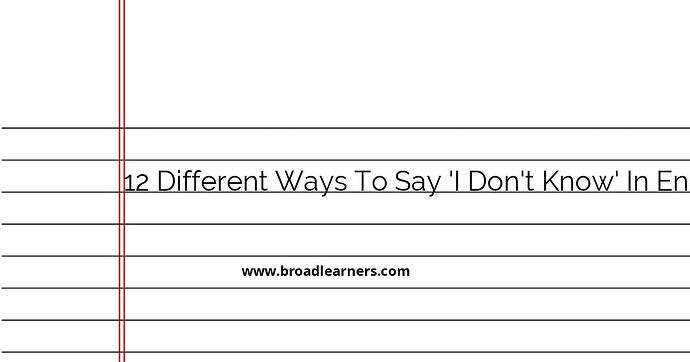When someone asks you a question and you don't have the answer, it's common to say 'I don't know'. However, using the same phrase repeatedly may sound repetitive and uninteresting. To add variety to your vocabulary, here are 12 different ways to say 'I don't know' in English:
- I have no idea
- I'm not sure
- I'm clueless
- I haven't got a clue
- Beats me
- I'm at a loss
- I'm uncertain
- I'm in the dark
- I can't say for certain
- I'm not knowledgeable on that subject
- It's beyond me
- I'm not familiar with that
Now, let's look at some examples of how you can use these phrases in sentences:
1. I have no idea
When someone asks you a question and you genuinely have no information or knowledge about it, you can say 'I have no idea'. For example:
Q: Do you know where my keys are?
A: I have no idea.
2. I'm not sure
When you are unsure or uncertain about something, you can say 'I'm not sure'. For example:
Q: Is it going to rain tomorrow?
A: I'm not sure.
3. I'm clueless
If you have no knowledge or understanding of a particular subject, you can say 'I'm clueless'. For example:
Q: Can you explain quantum physics to me?
A: Sorry, but I'm clueless about that.
4. I haven't got a clue
Similar to 'I'm clueless', you can also say 'I haven't got a clue'. For example:
Q: What's the capital of Uzbekistan?
A: I haven't got a clue.
5. Beats me
When you have no answer or explanation for something, you can say 'Beats me'. For example:
Q: Why did she leave so suddenly?
A: Beats me.
6. I'm at a loss
When you don't understand or know how to respond to a question, you can say 'I'm at a loss'. For example:
Q: What's the solution to this math problem?
A: I'm at a loss.
7. I'm uncertain
If you are unsure or have doubts about something, you can say 'I'm uncertain'. For example:
Q: Are they coming to the party?
A: I'm uncertain.
8. I'm in the dark
When you have no knowledge or information about a particular topic, you can say 'I'm in the dark'. For example:
Q: Do you know why the meeting was canceled?
A: I'm in the dark.
9. I can't say for certain
If you cannot provide a definite or certain answer, you can say 'I can't say for certain'. For example:
Q: Will he be able to finish the project on time?
A: I can't say for certain.
10. I'm not knowledgeable on that subject
When you don't have knowledge or expertise in a particular area, you can say 'I'm not knowledgeable on that subject'. For example:
Q: Can you explain the theory of relativity?
A: Sorry, I'm not knowledgeable on that subject.
11. It's beyond me
If something is too difficult or complex for you to understand, you can say 'It's beyond me'. For example:
Q: How does this computer program work?
A: It's beyond me.
12. I'm not familiar with that
If you are not familiar or acquainted with a certain topic or subject, you can say 'I'm not familiar with that'. For example:
Q: Have you read the latest book by that author?
A: Sorry, I'm not familiar with that.
Did I miss anything? Respond below
